Explanation of terms
Impotence
The term “impotence” is often used to describe a man’s persistent inability to achieve or maintain an erection during sexual arousal (“impotentia coeundi”, inability to have sexual intercourse). In medical circles today, the more neutral technical term “erectile dysfunction” is increasingly being used instead of the negatively connoted term “impotence”.
However, “impotence” in the broader sense is not only understood to mean “impotentia coeundi”, but also “impotentia generandi” (cf. infertility, inability to father children) or “impotentia ejaculandi”, the inability to ejaculate.
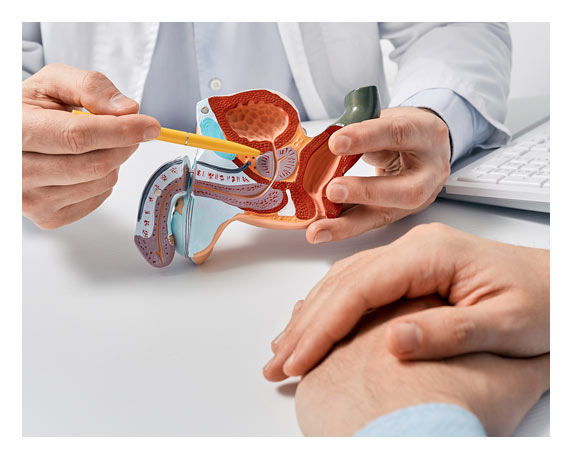
Causes of erectile dysfunction
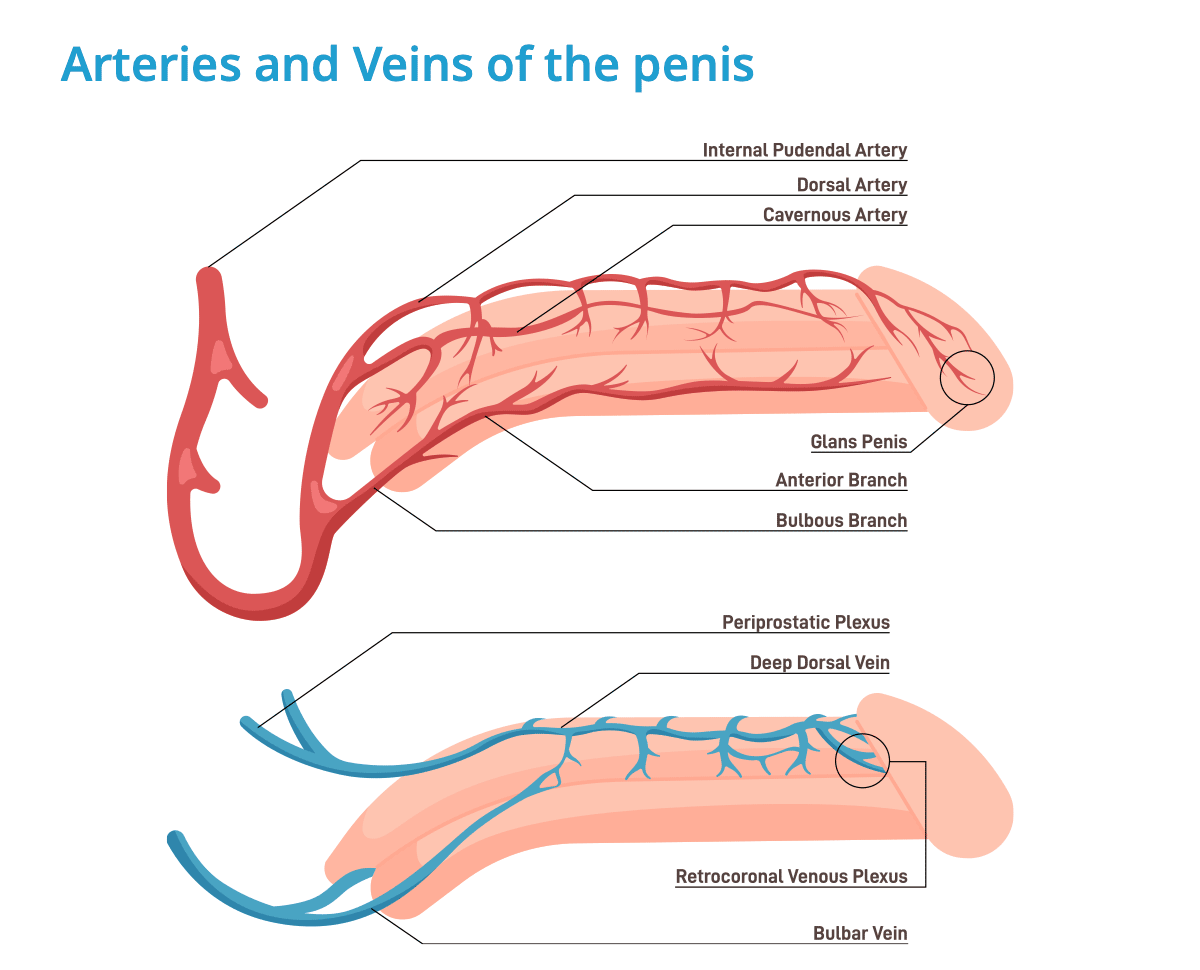
Cardiovascular diseases:
Problems with blood flow, as seen in heart disease, arteriosclerosis or high blood pressure, can affect the ability to have an erection. Artherosclerosis can directly affect the penile bloodsupply. Similar to the interventions for coronary heart desease, the penile arteries can be traeted in some cases of severe erectile dysfunction with a balloon dilatation and stenting to restore penile bloodflow.
Diabetes:
Diabetes can damage the nerves and blood vessels needed for a healthy erection.
Hormonal problems:
A lack of testosterone or an imbalance of other hormones can lead to erectile dysfunction.
Neurological disorders:
Conditions such as multiple sclerosis, Parkinson’s disease or spinal cord injuries can affect the transmission of nerve impulses required for an erection.
Medication side effects:
Some medications, including certain blood pressure medications, antidepressants and tranquilizers, can cause erectile dysfunction.


Psychological causes of erection problems

Stress and anxiety:
Pressure to perform, financial problems, relationship problems or general stress can cause a man to have difficulty getting an erection.
Depression:
Depression can not only reduce libido, but also affect the ability to feel sexual arousal, leading to erectile dysfunction.
Psychological trauma:
Past traumatic experiences, be it sexual abuse or other traumatic events, can have long-term effects on sexual health.Self-esteem and body image:
Negative feelings about one’s body or low self-esteem can impact the ability to achieve an erection.
Lifestyle factors:
Smoking:
Smoking can damage blood vessels and impair blood flow, which can lead to erectile dysfunction.
Alcohol and drug abuse:
Excessive alcohol or drug use can impair sexual performance.
Obesity and lack of exercise:
An unhealthy lifestyle can lead to obesity and other health problems that promote erectile dysfunction.
Symptoms of erectile dysfunction
The symptoms of erectile dysfunction can be diverse and vary depending on the individual situation. The most common symptoms include difficulty achieving or maintaining an erection, even with sufficient sexual stimulation. There is insufficient blood flow to the penis, which means that the blood supply to the erectile tissue is insufficient to enable a sufficient erection. In such cases, one speaks of vascular or vascular-related erectile dysfunction. Men with erectile dysfunction may also experience a reduced libido or a general lack of interest in sexual activity.
Erection problems are often accompanied by feelings of frustration, stress, anxiety or low self-esteem. In some cases, physical symptoms such as pain in the genital area, e.g. Peyronie’s disease, or problems urinating may also occur. It is important to emphasize that erectile dysfunction is experienced individually and that not all men show the same symptoms and suffer to the same extent. However, if problems with erections occur repeatedly and over a longer period of time, it is advisable to consult a doctor to clarify the causes and initiate appropriate treatment.
What can you do about erectile dysfunction?
Drug treatment
PDE-5 inhibitors
Treatment for erectile dysfunction includes a wide range of options that can vary depending on the individual needs of the person affected and the causes of the disorder. A common first-line treatment is oral medications called PDE-5 inhibitors, such as Viagra or Cialis, which can improve blood flow to the penis and support the ability to achieve an erection.
SKAT (erectile tissue autoinjection therapy)
If PDE-5 inhibitors such as Viagra and Cialis are not effective or only insufficiently effective, an erection can be “forced” with a self-injection of medication that increases the local blood supply to the erectile tissue. Various medications such as alprostadil (Caverject), papaverine and phentolamine can be used in different concentrations (Androskat/ Trimix).
It is important that the optimum dosage is initially determined under medical supervision and that the correct injection technique is learned. This is necessary to avoid the risk of an excessively long erection (> 4-6 hours = priapism), wich could lead to permanent damage to the penile tissue.
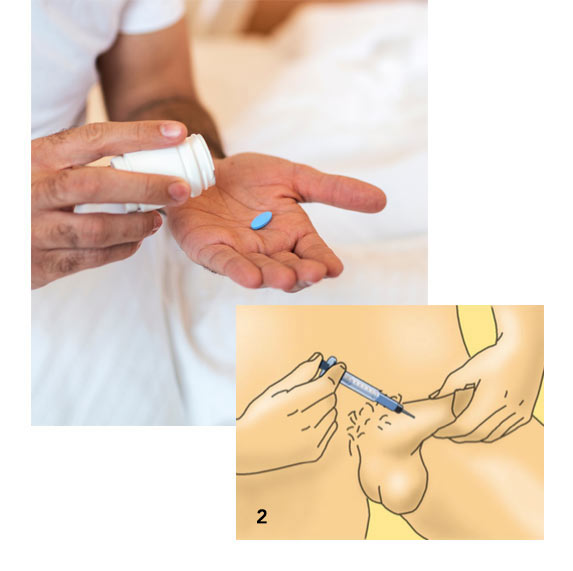
Fig. 2: Principle of erectile tissue autoinjection therapy with vasoactive substances for patients in whom PDE-5 inhibitors are not effective.
Non-drug alternatives
Pelvic floor training
With physiotherapy or specific muscle training or with electromagnetic muscle stimulation (Pelvipower or Emsella)
penis vacuum pump
Regular use of a penis vacuum pump (1-2 times a day for 5 minutes) leads to a regenerative stimulus on the erectile tissue and can thus lead to an improvement in erectile function.
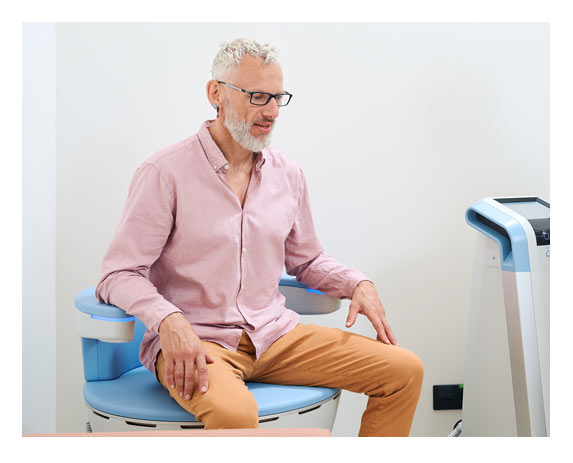

Shock wave therapy for erectile dysfunction (ESWT)
Shock wave therapy for erectile dysfunction has become increasingly important in recent years. In this non-invasive treatment method, high-energy acoustic waves are targeted at the penile area. These waves stimulate the formation of new blood vessels and improve blood flow to the penile tissue, which in turn can lead to improved erectile function. Shockwave therapy is often seen as an alternative to medication or invasive procedures and offers a promising option for men with erectile dysfunction, especially if other treatments have not been successful or have not been tolerated. The treatment is painless and requires no anesthesia or downtime, making it an attractive option for many patients.

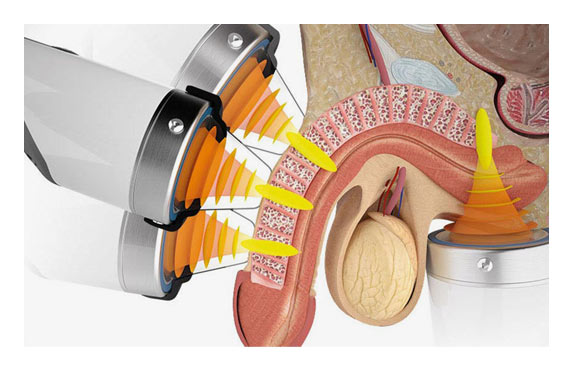
Treatment with P-Shot
The P-Shot, also known as the Priapus Shot, is a gentle, minimally invasive treatment option for men with erectile dysfunction (ED). This injection treatment uses the patient’s own plasma, which is rich in growth factors. After the plasma is collected and processed through a blood draw, it is injected into different areas of the penis to promote tissue and blood vessel regeneration. This process can improve blood flow, increase sensitivity and improve overall erectile function.
As accompanying measures, we recommend a series of treatments with acoustic wave therapy (ESWT/Androwave), regular use of a penis pump and strengthening of the pelvic floor muscles with the PelviPower System.
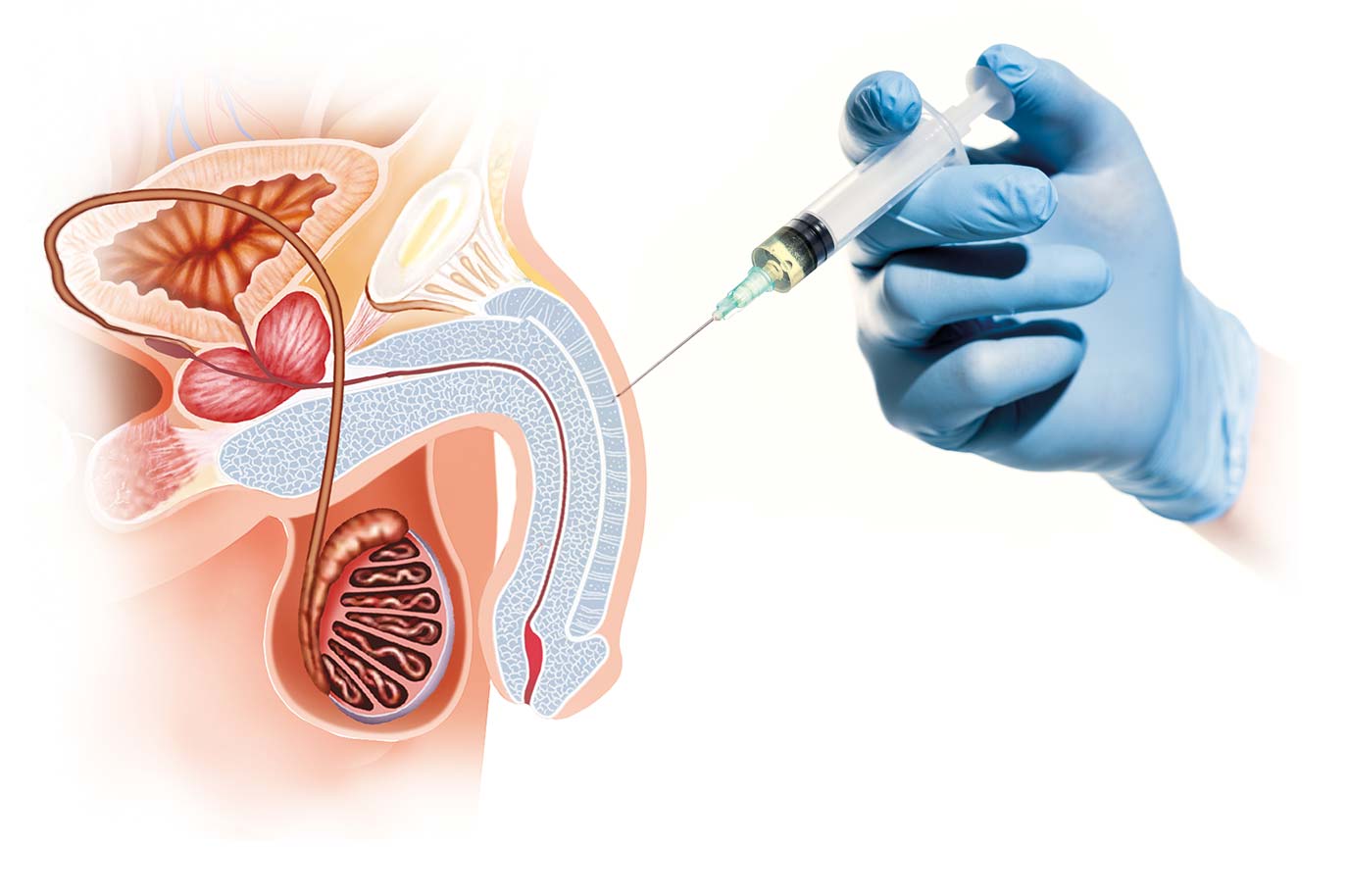

Treatment with Bocox / PriapusToxin™
Another option for treating erectile dysfunction, again with medication, is Bocox. With this therapy, 100 units of botulinum toxin A are injected into the erectile tissue of the penis. This causes the muscle wall of the arteries in the penis to relax, leading to improved blood flow and a stronger erection. The treatment also increases the length of the flaccid penis by around 1 cm.
Depending on the initial situation, it is advisable to combine different treatments.
Frequently asked questions about erectile dysfunction
At what age do erectile dysfunctions occur?
Erectile dysfunction can affect men of any age and there is no fixed age limit at which it can occur. However, the risk of erectile dysfunction tends to increase with age. While younger men are more likely to be affected by psychological factors such as stress or pressure to perform, older men often have physical causes.
Can a testosterone deficiency cause erection problems?
Yes, a lack of testosterone can lead to erectile dysfunction. Testosterone is the main male sex hormone and plays a crucial role in regulating sexual functions, including sperm production and maintaining libido. If a man has low testosterone levels, this can lead to impaired sexual function, including erectile dysfunction.
Can erectile dysfunction disappear again?
Yes, erectile dysfunction can be temporary and improve or disappear completely, especially if it is caused by psychological factors such as stress. Even with physical causes such as high blood pressure or diabetes, appropriate treatment can improve erectile function. Lifestyle changes such as a healthy diet, smoking cessation and regular exercise can also help.
Is there a home remedy for erectile dysfunction?
Ginseng is often reported as a home remedy for erectile dysfunction. However, the effects appear to be too small to treat severe erectile dysfunction. The potency-enhancing effect of most herbal remedies such as yohimbine has not been scientifically proven.
What can I do about erectile dysfunction caused by psychological factors?
In addition to the treatment options mentioned above, psychotherapeutic approaches such as cognitive behavioral therapy or couples therapy can also be helpful, especially if the erectile dysfunction is due to corresponding factors.
Can erectile dysfunction be prevented?
Lifestyle changes such as smoking cessation, weight loss, regular physical activity, pelvic floor exercises and a healthy diet can help to maintain and improve sexual health.
Can diabetes cause erectile dysfunction?
Yes, diabetes is a common cause of erectile dysfunction. It is important to talk to a doctor to identify the appropriate treatment option and receive a customized therapy.
Can alcohol cause erectile problems?
Yes, alcohol can interfere with the neurological signaling required to initiate and maintain an erection. In addition, alcohol consumption can lead to dilation of blood vessels, which can negatively affect erections. Excessive alcohol consumption can lead to chronic erection problems over time.
Are impotence and erectile dysfunction the same thing?
Often the terms ‘erectile dysfunction’ and ‘impotence’ are used interchangeably, although they are different in a medical context. The term “erectile dysfunction” refers more specifically to the inability to achieve or maintain an erection, while “impotence” is a more general term that describes the inability to reproduce.

Consultation with Dr. Ledermann
Do you have questions regarding the P-Shot® treatment? Would you like a personal appointment with Dr Ledermann? Feel free to contact us. We are happy to be of assistance.
Tel. +41 44 500 46 46 or write to us.
Appointments can also be made directly online via mycheckin.ch!
You can find us here:
Checkin Zollhaus
Zollstrasse 121
8005 Zürich
Tel. 044 500 46 46
www.mycheckin.ch


